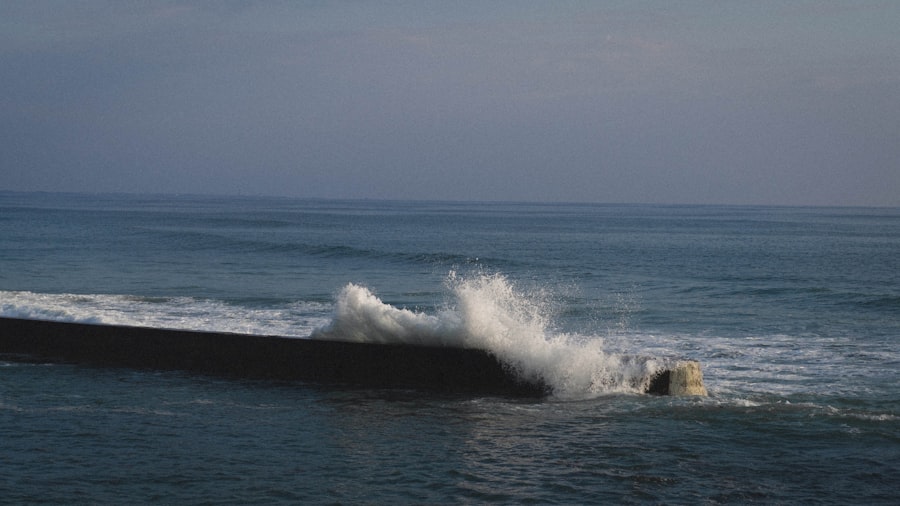Anti-Submarine Warfare (ASW) has emerged as a critical component of modern military strategy, particularly in an era marked by increasing maritime tensions and the proliferation of advanced submarine technologies. The significance of ASW lies not only in its direct military applications but also in its broader implications for national security and international stability. As nations invest heavily in submarine capabilities, the ability to detect, track, and neutralize these underwater threats becomes paramount.
This necessity drives the development of sophisticated ASW tactics and technologies, which are essential for maintaining a strategic advantage in naval operations. Moreover, the importance of ASW extends beyond mere defense mechanisms; it encompasses a complex interplay of military readiness, diplomatic relations, and international cooperation. The rise of submarine warfare has prompted nations to rethink their defense strategies and engage in diplomatic dialogues aimed at mitigating potential conflicts.
Understanding the multifaceted nature of ASW is crucial for policymakers, military strategists, and diplomats alike, as they navigate the intricate landscape of global security.
Key Takeaways
- Anti-submarine warfare is crucial for maintaining maritime security and protecting national interests.
- Defense plays a vital role in anti-submarine warfare, including the use of advanced technology and strategic planning.
- Diplomacy is essential in anti-submarine warfare to build alliances, negotiate agreements, and prevent conflicts.
- Balancing defense and diplomacy is key to effectively addressing the challenges of anti-submarine warfare.
- International collaboration and ethical considerations are important factors in the future of anti-submarine warfare and diplomacy.
The Role of Defense in Anti-Submarine Warfare
Defense plays a pivotal role in the realm of Anti-Submarine Warfare, serving as the first line of protection against potential underwater threats. Nations invest in advanced naval assets, including submarines, surface ships, and aircraft equipped with cutting-edge sonar and surveillance technologies. These resources are essential for conducting effective ASW operations, which involve detecting enemy submarines before they can launch attacks or gather intelligence.
The development of robust defense capabilities not only enhances a nation’s security posture but also serves as a deterrent against adversaries who may consider aggressive actions. In addition to technological advancements, training and preparedness are critical components of defense in ASW. Naval forces must engage in regular exercises to hone their skills in submarine detection and engagement.
These drills not only improve operational readiness but also foster collaboration among allied nations, enhancing collective security efforts. The emphasis on defense within ASW underscores the necessity for nations to remain vigilant and proactive in safeguarding their maritime interests against evolving threats.
The Role of Diplomacy in Anti-Submarine Warfare

While defense is vital in Anti-Submarine Warfare, diplomacy plays an equally important role in shaping the strategic landscape. Diplomatic efforts can help de-escalate tensions that may arise from submarine activities, fostering an environment where nations can address their concerns through dialogue rather than conflict. Engaging in diplomatic discussions allows countries to clarify their intentions regarding submarine operations, reducing the likelihood of misunderstandings that could lead to military confrontations.
Furthermore, diplomacy can facilitate international agreements aimed at regulating submarine activities and enhancing transparency among nations. Such agreements can include confidence-building measures that promote information sharing about submarine capabilities and operations. By establishing frameworks for cooperation, countries can work together to address common challenges posed by submarine warfare, ultimately contributing to regional stability and security.
Balancing Defense and Diplomacy in Anti-Submarine Warfare
| Metrics | Defense | Diplomacy |
|---|---|---|
| Naval Assets | Increased deployment of submarines, surface ships, and aircraft | Engagement with international partners for joint exercises and information sharing |
| Technological Advancements | Investment in advanced sonar systems and anti-submarine warfare technology | Collaboration with allies for research and development of new anti-submarine warfare capabilities |
| Strategic Alliances | Formation of defense pacts and alliances to strengthen anti-submarine warfare capabilities | Diplomatic efforts to build consensus on maritime security and anti-submarine warfare strategies |
| Intelligence Sharing | Enhanced intelligence gathering and analysis to detect and track enemy submarines | Information exchange with partner nations to improve situational awareness and response coordination |
The interplay between defense and diplomacy in Anti-Submarine Warfare is complex and requires careful balancing. On one hand, nations must maintain robust defense capabilities to deter potential threats from adversaries. On the other hand, excessive militarization can exacerbate tensions and lead to an arms race in submarine technology.
Striking the right balance is essential for ensuring that defense measures do not undermine diplomatic efforts aimed at conflict resolution. To achieve this equilibrium, nations must adopt a comprehensive approach that integrates both defense and diplomacy into their ASW strategies. This may involve engaging in multilateral dialogues that address security concerns while simultaneously investing in advanced ASW technologies.
By fostering an environment where defense capabilities are complemented by diplomatic initiatives, countries can enhance their security without escalating regional tensions.
The Impact of Anti-Submarine Warfare on International Relations
The dynamics of Anti-Submarine Warfare have significant implications for international relations. As countries enhance their submarine capabilities, the potential for miscalculations and conflicts increases. The presence of advanced submarines in contested waters can lead to heightened tensions between rival nations, prompting them to reassess their military strategies and alliances.
Consequently, ASW becomes a focal point in discussions about maritime security and geopolitical stability. Moreover, the proliferation of submarine technology has led to shifts in power dynamics among nations. Countries with advanced ASW capabilities may find themselves in a position of strength, influencing regional security arrangements and alliances.
Conversely, nations lacking such capabilities may seek partnerships with more advanced militaries to bolster their own defenses. This evolving landscape underscores the importance of understanding how ASW shapes international relations and influences diplomatic interactions among states.
Strategies for Effective Anti-Submarine Warfare Diplomacy

To navigate the complexities of Anti-Submarine Warfare diplomacy effectively, nations must adopt a range of strategies that promote dialogue and cooperation. One key approach is the establishment of regular communication channels between naval forces of different countries. These channels can facilitate information sharing about submarine operations and enhance mutual understanding among nations.
By fostering transparency, countries can reduce the risk of misunderstandings that could escalate into conflicts.
Collaborative efforts allow nations to demonstrate their commitment to collective security and build trust among allies.
Furthermore, engaging in multilateral forums focused on maritime security can provide a platform for discussing ASW-related issues and developing cooperative solutions to shared challenges.
The Role of Technology in Anti-Submarine Warfare Diplomacy
Technology plays a crucial role in shaping both the defense and diplomatic aspects of Anti-Submarine Warfare. Advanced sonar systems, unmanned underwater vehicles (UUVs), and artificial intelligence (AI) are transforming how nations conduct ASW operations. These technological advancements not only enhance detection capabilities but also provide opportunities for greater collaboration among allies.
In terms of diplomacy, technology can facilitate real-time information sharing between nations regarding submarine activities. Enhanced communication systems enable countries to exchange data on submarine movements and capabilities, fostering transparency and trust. Moreover, joint development initiatives focused on ASW technologies can strengthen partnerships between nations while promoting innovation in maritime security.
International Collaboration in Anti-Submarine Warfare
International collaboration is essential for addressing the challenges posed by Anti-Submarine Warfare effectively. As submarines operate across vast oceanic expanses, no single nation can ensure its security independently. Collaborative efforts among allied nations can enhance collective ASW capabilities through shared resources, intelligence, and training.
Multinational exercises focused on ASW provide an opportunity for countries to work together in realistic scenarios that simulate potential threats. These exercises not only improve operational effectiveness but also strengthen relationships among participating nations. Additionally, establishing formal alliances or partnerships dedicated to ASW can create frameworks for ongoing cooperation and information sharing.
The Ethical Considerations of Anti-Submarine Warfare Diplomacy
The ethical dimensions of Anti-Submarine Warfare diplomacy warrant careful consideration as nations navigate complex security challenges. The potential for escalation into armed conflict raises questions about the moral implications of military preparedness versus diplomatic engagement. Policymakers must weigh the consequences of their actions on regional stability while ensuring that national interests are safeguarded.
Furthermore, ethical considerations extend to the impact of submarine warfare on civilian populations and marine ecosystems.
Engaging in responsible practices that prioritize humanitarian concerns can enhance a nation’s credibility on the international stage while fostering goodwill among other states.
Challenges and Opportunities in Balancing Defense and Diplomacy in Anti-Submarine Warfare
Balancing defense and diplomacy within the context of Anti-Submarine Warfare presents both challenges and opportunities for nations worldwide. One significant challenge lies in addressing the inherent tension between military preparedness and diplomatic engagement. As countries invest heavily in ASW capabilities, there is a risk that they may prioritize defense over dialogue, leading to increased tensions.
However, this challenge also presents an opportunity for innovative approaches to security cooperation. By recognizing the interconnectedness of defense and diplomacy, nations can develop comprehensive strategies that leverage both aspects effectively. Engaging in proactive diplomacy while maintaining robust defense capabilities can create a more stable security environment where conflicts are less likely to arise.
The Future of Anti-Submarine Warfare and Diplomacy
The future of Anti-Submarine Warfare will undoubtedly be shaped by ongoing advancements in technology, evolving geopolitical dynamics, and the need for effective diplomatic engagement. As nations continue to enhance their submarine capabilities, the importance of balancing defense with diplomacy will remain paramount. By fostering international collaboration and prioritizing transparent communication, countries can navigate the complexities of ASW while promoting regional stability.
Ultimately, the successful integration of defense and diplomacy within Anti-Submarine Warfare strategies will determine how effectively nations can address emerging threats while safeguarding their national interests. As global maritime challenges evolve, so too must the approaches taken by policymakers and military leaders to ensure a secure future for all nations involved in maritime operations.
In recent years, the field of anti-submarine warfare has faced significant challenges, particularly with the advent of new technologies that threaten to compromise traditional methods. An insightful article on this topic can be found on the website “In The War Room,” which delves into the complexities and evolving strategies within this domain. The article discusses how advancements in stealth technology and underwater drones are reshaping the landscape of naval defense. For a deeper understanding of these developments, you can read the full article by visiting In The War Room.
WATCH THIS 🤯How the KGB Stole America’s Future
FAQs
What is anti-submarine warfare (ASW) compromise?
ASW compromise refers to the unauthorized access, theft, or loss of sensitive information, technology, or tactics related to anti-submarine warfare. This compromise can occur through cyber attacks, espionage, or other means, and can pose a significant threat to national security.
What are the potential consequences of an ASW compromise?
The potential consequences of an ASW compromise include the loss of strategic advantage in detecting and countering enemy submarines, compromised operational security, and an increased risk to naval forces and maritime assets. This can undermine military readiness and the ability to protect maritime interests.
How can ASW compromise be prevented?
Preventing ASW compromise requires robust cybersecurity measures, strict adherence to security protocols, regular security audits, and continuous monitoring of sensitive information. Additionally, personnel training, counterintelligence efforts, and collaboration with allied nations can help mitigate the risk of ASW compromise.
What are the challenges in addressing ASW compromise?
Challenges in addressing ASW compromise include the evolving nature of cyber threats, the need to balance information sharing with security, and the difficulty of detecting and attributing espionage activities. Additionally, the interconnected nature of global maritime operations presents challenges in securing sensitive ASW capabilities.




